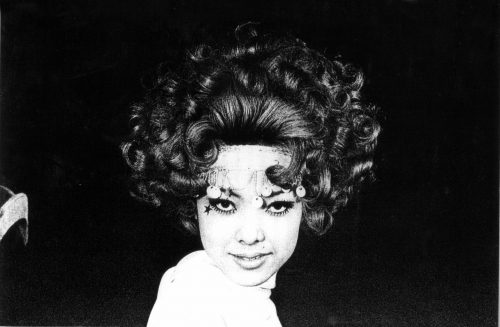Criterion Prediction #94: Funeral Parade of Roses, by Alexander Miller
Title: Funeral Parade of Roses (Bara no Soretsu)
Year: 1969
Director: Toshio Matsumoto
Cast: Pîtâ, Yoshio Tsuchiya, Osamu Ogasawara, Emiko Azuma
Synopsis: Funeral Parade of Roses is an experimental exploration of gay culture that is also a modernized Oedipus tale with fragmented diversions into documentary territory that looks at gay/trans culture in 1960’s Japan. Transvestite Eddie begins an affair, Eddie, while they try to avoid Eddie’s girlfriend Leda (Ogasawara) snippets of Eddie’s troubled past come to light.
Critique: There’s a fine line with avant-garde/experimental cinema, especially from the sixties and seventies; orthodoxies inspired by the counter-cultural tenor can serve as a fun time capsule or they can age terribly. Objectively speaking, I champion a film like Easy Rider but understand all too well those who might find its psychedelic furnishings a tad off-putting; on one end of the spectrum, the witchy/homoerotic work of Kenneth Anger feels timeless while the heady architecture of Jodorowsky’s lysergic fables seem less impactful with age.
Funeral Parade of Roses lands somewhere in the middle. The aesthetic is very much of its time; the flashy quick cutting, jokey visuals and Warhol inspired pop-art inflections make this a consistently interesting film to mull over.
Matsumoto’s the kind of director who can fearlessly traverse from dreamy sensuality, broad, physical humor, fantastical violence and surreal sexuality. It’s a boldly expressionistic film that dares the audience to look at a ridiculed subculture and pushes the film to a bombastic tipping point with wall-breaking psychedelia. You could say Funeral Parade of Roses is gleefully breaking every rule and convention, but I would postulate Toshio Matsumoto didn’t give a shit about conventions, and we’re all the better off for it.
Despite the experimental film contingent with avant-garde directors Shuji Terayama, Osamu Tezuka, and the more commercially viable but unconventional Hiroshi Teshigahara, Funeral Parade of Roses is a huge break from the typical portrayal of sexuality in Japanese film and is (likely) the earliest feature to portraying gay/trans characters. Sex in Japanese cinema is usually rigidly unflattering, male-centric, and, for lack of better wording, rapey and violent with first-wave pinky films on the rise. While the work of Ichikawa, Teshigahara, and Imamura explored eroticism and the contradictory elements of Yukio Mishima’s legacy (and sexuality) were rumbling, the countercultural wave of the West was loosening the screws of the more mechanized, heterosexual cinema of Japan.
Perhaps this is due to the collective international influence on Matsumoto of the peripheral work of Anger, Svankmajer, McLaren, Marker and the oft-cited Godard at play.
Funeral Parade of Roses is the type of film that goes all in; nothing is held back regarding style and content. There’s lofty pontifications on art, culture, life, and so forth, but Matsumoto’s gambit pays off in that he’s self-deprecating and his metaphysical referendums are a bonding agent in this composed hodge-podge of playful imagery that is both feverishly violent, (gory even) as well as cartoonish, and ironic. Sex scenes unfold in fast motion with a tongue-in-cheek rendition of the folk song The More We Get Together (or Hail to the Bus Driver) playing. It’s no wonder where Kubrick drew inspiration for A Clockwork Orange.
Matsumoto has no qualms in committing to a high-art approach with his direction; it’s a bold movie that plays everything fast and loose—a rebel yell declaration of youthful individualism—and there’s plenty of angles and segues but, unlike the roughly hewn counterparts of underground cinema, there are no rough patches that need sanding.
Why it Belongs in the Collection: It’s not like holding your ear to the ground or a crystal ball; granted, there’s plenty of overlapping titles between The Masters of Cinema and The Criterion Collection regardless of region or who released what first. That seems to be the case with the Japanese movies that are distributed through Masters of Cinema; movies that would go on to be hosted by Criterion include but aren’t restricted to Kuroneko, Hausu, A Woman in the Dunes, and Gate of Hell. For a movie as unique as Funeral Parade of Roses, I’m surprised it hasn’t already made its way to the collection. Matsumoto’s 1969 classic fits their distribution model and his experimental short movies would make for some good bonus material; that is, on top of the director’s interview and the commentary that would likely carry over, should we be graced with this title. Otherwise, region free Blu-ray players are getting less expensive? Most importantly, this is a movie that is ready for a slightly more evolved social climate and more visible LGBT community.





























Maybe a quick google search was in order before writing this? https://goo.gl/KXZk9t
It was the campaign at the end of the UnicorBooty.com review that convinced me, thanks for the shoutout on twitter, can’t wait for the blu-ray!